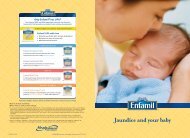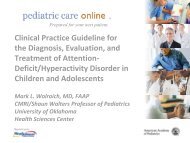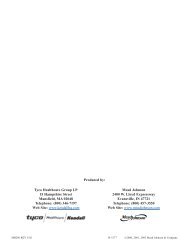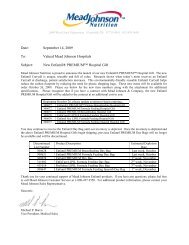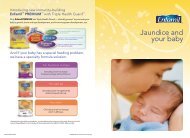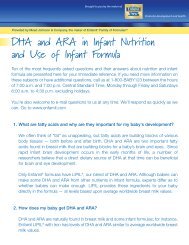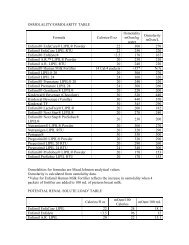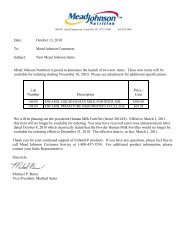LB2882MaternalNutriti+ - Mead Johnson Nutrition
LB2882MaternalNutriti+ - Mead Johnson Nutrition
LB2882MaternalNutriti+ - Mead Johnson Nutrition
Create successful ePaper yourself
Turn your PDF publications into a flip-book with our unique Google optimized e-Paper software.
EXECUTIVE SUMMARY<br />
A mother’s nutritional status, diet and lifestyle influence pregnancy and lactation outcomes and can have lasting<br />
effects on her offspring’s health. This monograph reviews current nutrition and nutrition-related recommendations for<br />
women during pregnancy and lactation. The goal in highlighting these recommendations is to increase familiarity with<br />
nutrients and nutrition-related issues that can have an important impact during pregnancy, lactation, and beyond.<br />
Experts around the world increasingly emphasize the importance of providing preconception health services that<br />
include screening for health risks that could affect the outcome of a future pregnancy. 1,2 Women should be counseled<br />
regarding the benefits of achieving a healthy weight prior to pregnancy, regular physical activity, consuming a<br />
balanced diet with adequate folic acid, and controlling preexisting medical conditions, such as diabetes, along with<br />
other factors that influence pregnancy outcome. 2<br />
To help optimize conception and pregnancy outcomes, women should strive to enter pregnancy with a Body Mass<br />
Index (BMI) within the normal range (18.5 to 24.9 kg/m 2 ). 3 Weight-gain and weight-monitoring recommendations<br />
during pregnancy vary around the world 4 and women should follow recommendations endorsed by experts in their<br />
countries. In 2009, the Institute of Medicine (IOM) in the United States updated its pregnancy weight gain guidelines<br />
as a result of rising obesity rates, the large proportion of women with high gestational weight gain, and the strength<br />
of the evidence linking gestational weight gain to certain adverse outcomes. 3 The recommended weight gain ranges<br />
vary significantly according to a woman’s pre-pregnancy BMI. Women within the normal BMI range should gain<br />
between 25 and 35 pounds. Overweight and obese women are encouraged to gain less (15 to 25 pounds for<br />
overweight women; 11 to 20 pounds for obese women). 3<br />
Recommended intakes for energy and the macronutrients, carbohydrate and protein, increase during pregnancy<br />
and are easily achieved by most women who are eating a balanced diet. 5-7 Recommended intake for total fat, as a<br />
percentage of energy, does not increase during pregnancy and lactation. 5,8 However, the importance of consuming<br />
long chain polyunsaturated fatty acids (LCPUFA), particularly docosahexaenoic acid (DHA), during pregnancy and<br />
lactation has received increased emphasis in recent years. Exact requirements for DHA during pregnancy and<br />
lactation have not been determined but in 2010 three groups published recommendations on DHA intakes. The<br />
minimum amount of DHA recommended during pregnancy and lactation by these groups is 200 mg per day. 8-10<br />
Recommended intakes of several vitamins and minerals also increase during pregnancy and lactation and many of<br />
these recommendations can be met with a balanced diet. While appropriate intake of all vitamins and minerals is<br />
important, some deserve particular attention with pregnancy. For example, adequate folic acid intake prior to and<br />
during the first few weeks of pregnancy is associated with a reduced risk of neural tube defects (NTDs) 11,12 and<br />
observational studies suggest that adequate choline intake during early pregnancy may positively influence neural<br />
tube closure, independent of folate. 13,14 Emerging evidence indicates that vitamin D may play an important role<br />
in immunity and neurocognitive development in addition to its roles in calcium homeostasis and bone health. 15,16<br />
Inadequate intakes of vitamin A, iron and iodine are associated with night-blindness, anemia, and brain damage,<br />
respectively. 17-19 While adequate intakes of vitamins and minerals during pregnancy are essential, excessive intakes of<br />
some can have negative consequences and should be avoided. For example, excessive intake of preformed vitamin<br />
A (retinoids) during pregnancy increases the risk of birth defects. 20,21<br />
Food guides can be used by women and their health care providers to design balanced eating plans before<br />
pregnancy for achieving desirable weight, and to support a healthy pregnancy and lactation. Some countries around<br />
the world have adopted food guides based on those developed in the US while others have developed their own<br />
specific guides that are based on the country’s food supply, food consumption patterns, nutrition issues and nutrition<br />
standards. 22 Women should use food guides that are adopted by the countries in which they live.<br />
3





